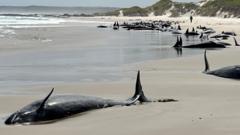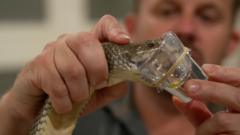About 90 false killer whales will be euthanised after beaching on a remote Tasmanian beach, as complex conditions make successful rescue impossible, following a series of mass strandings in the area.
Euthanasia for 90 False Killer Whales Following Tragic Mass Stranding in Tasmania

Euthanasia for 90 False Killer Whales Following Tragic Mass Stranding in Tasmania
Authorities in Tasmania have made the heartbreaking decision to euthanise a pod of stranded false killer whales after failed rescue attempts.
Authorities in Tasmania have confirmed the difficult decision to euthanise approximately 90 false killer whales that survived a recent mass stranding on a remote beach. The pod, comprising a total of 157 whales, stranded along Tasmania's rugged north-west coast near Arthur River. Tragically, many of the whales perished shortly after the stranding.
Experts arrived at the scene, assessing the animals' chances for survival, but concluded that the unique geographical and weather-related challenges made rescue efforts futile. Local resident Jocelyn Flint expressed her distress, having witnessed the stranded whales with her son during a fishing expedition. "Their eyes are open, they're looking at me, like 'help,'" she recalled.
The stranded whales had reportedly been on the beach for 24 to 48 hours before authorities intervened. False killer whales, one of the largest dolphin species, can reach sizes of up to 6 meters (19 feet) and weigh as much as 1.5 tonnes. Given the extreme stresses faced by the surviving whales, marine biologist Kris Carlyon stated that the location was one of the most challenging he had encountered in over a decade.
Initial efforts to move the animals back to the ocean were unsuccessful, with strong surf preventing their escape. The situation worsened as weather forecasts predicted similar conditions for the subsequent days, leading wildlife veterinarians to make the heart-wrenching decision to euthanise the remaining whales to prevent prolonged suffering.
Euthanasia is considered a last resort, and the procedure is set to commence soon. Authorities are also deliberating on the appropriate disposal of the carcasses, mindful of the site’s significance to Aboriginal culture. There are concerns about public safety as bushfires are also reported in the vicinity, leading officials to discourage visits to the stranding site.
Mass whale strandings are a distressing issue in Tasmania, which has seen a high rate of such events, particularly in recent years. Experts are still investigating the various factors contributing to these occurrences, which often involve complex interactions within the social groups of whales.




















